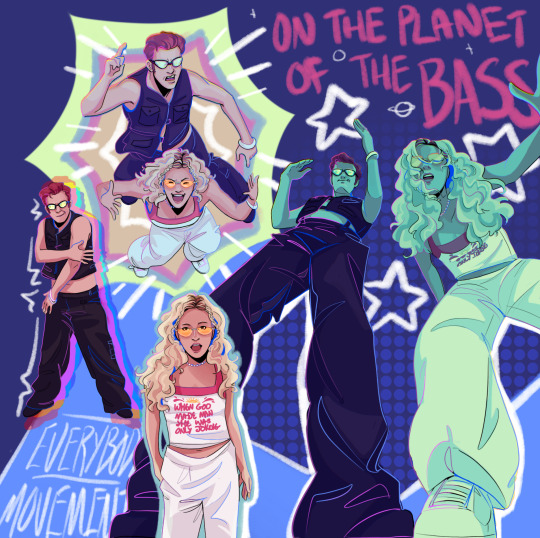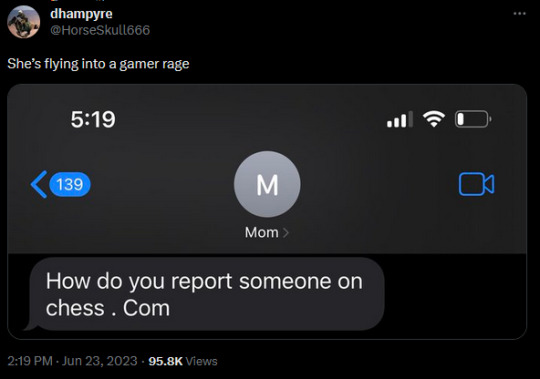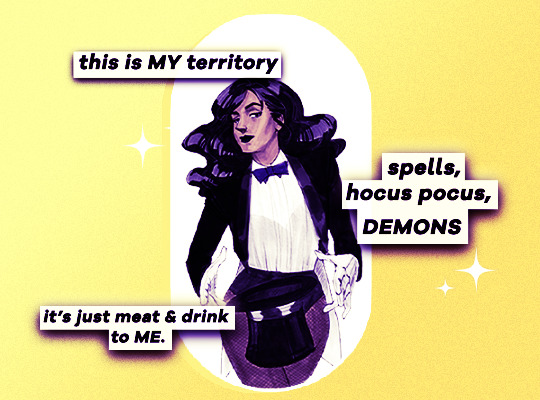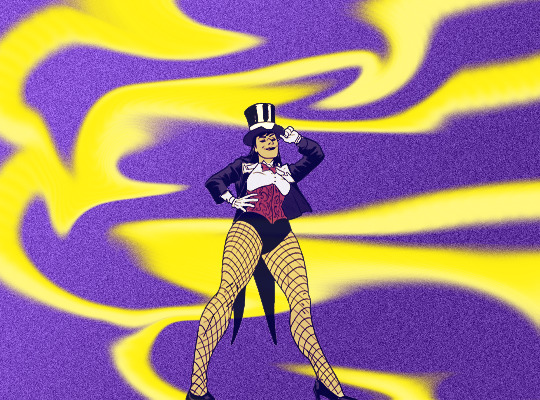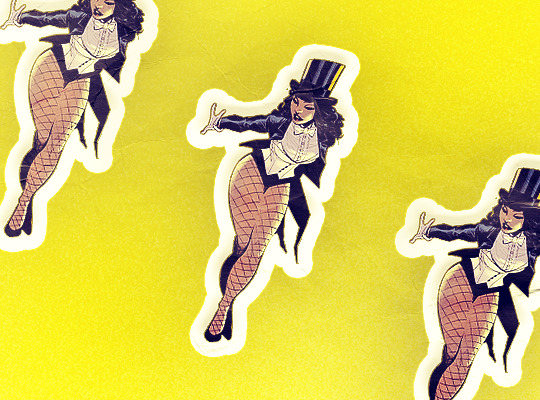26. she/her. lesbian. marvel + dc. layout credit: @nethandrake
Don't wanna be here? Send us removal request.
Text
Huntress drawing I did with a little redesign. Just playing with designs really.

Helena Bertinelli drawing
191 notes
·
View notes
Text
don’t let anyone else ruin your day. it‘s YOUR day. ruin it yourself.
32K notes
·
View notes
Text

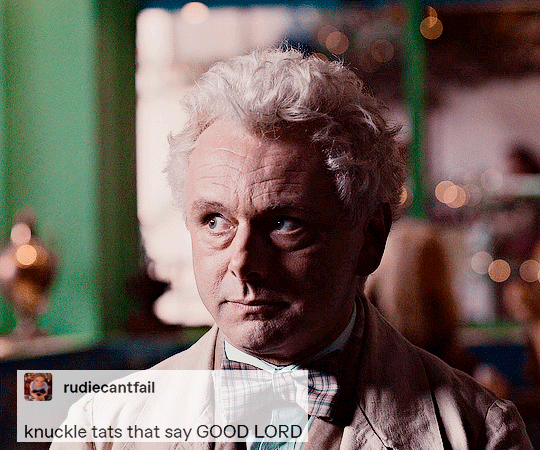

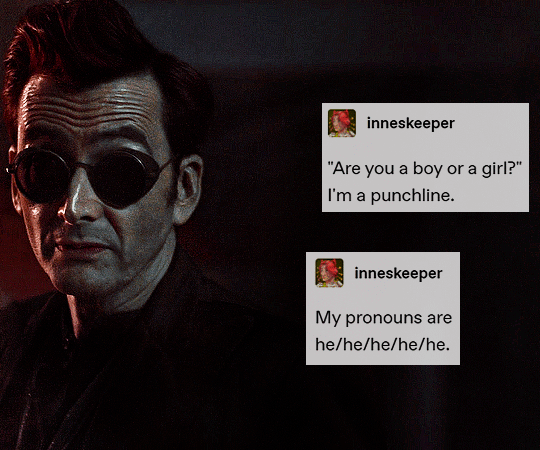
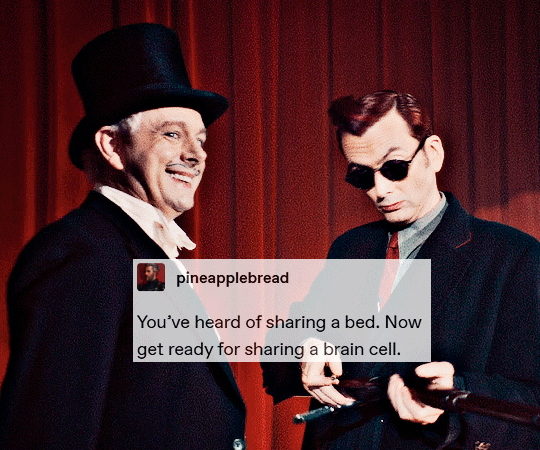





ineffable husbands + text posts bonus:
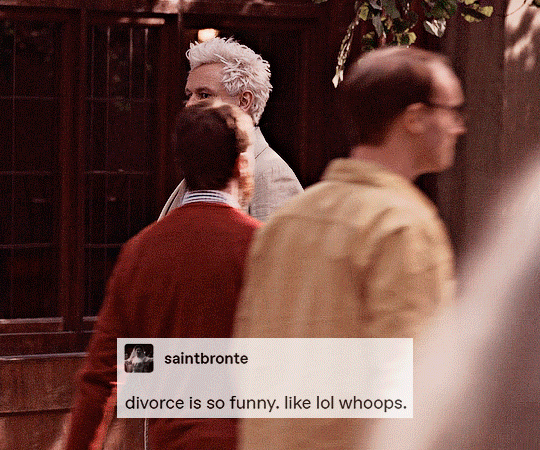
12K notes
·
View notes
Photo
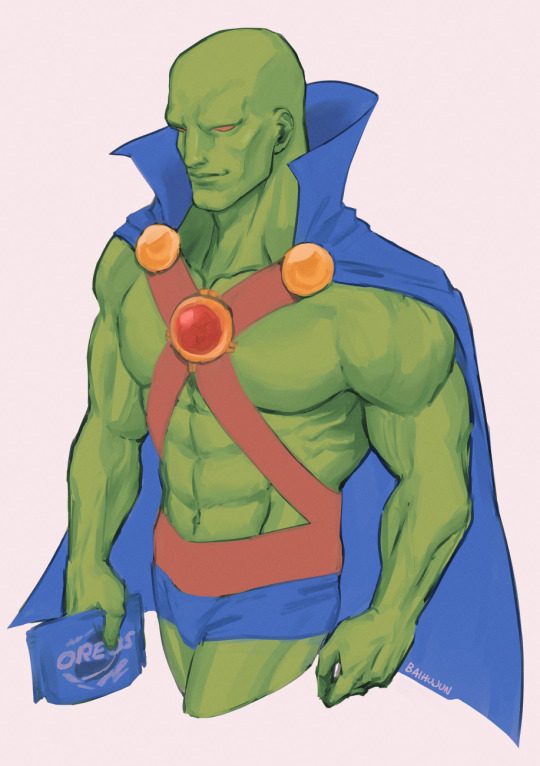
A rough Manhunter, Martian Manhunter
1K notes
·
View notes
Text
The thing about romance is, it makes a good story.
As soon as Neil described season 2 as "quiet, gentle, romantic" I figured we'd be in for it, because as he's the first to point out, writers are liars. And the best way to deceive is with truth.
Season 2 is romantic. The trappings of romance are everywhere. Crowley tries to set up Nina and Maggie by trapping them under an awning during a rainstorm, a classic cinematic bonding technique. Aziraphale's chosen method comes from his beloved books: the ball, the dancing, appearing as a pair in public, hands held as you twirl gracefully with your heart thrilled and racing. If they can set up a sensational kiss that will unlock the happy ever after. They've lived on earth, they've studied the tropes, they know how romance works.
The problem is a story is only a story.
Nina and Maggie had the classic romantic setup completely by accident before Aziraphale and Crowley ever began trying to interfere with them. They get locked in Nina's coffeeshop. They can't escape or communicate with anyone else, they end up talking by candlelight because there's no electricity, Nina offers wine. Maggie mentions how she'd hoped for a chance to talk to Nina, and now here they are. It's every bit as much a standard as what Aziraphale and Crowley attempt to arrange. Blanket scenarios galore exist because of that starting point. We love that story. And there's nothing wrong with that!
But it's still only a story, it's not enough. Because once that moment of connection is over, however lovely it was, all the rest of the world comes flooding back in in the form of dozens of angry text messages. Nina's messy entrapping relationship hasn't magically gone away just because she and Maggie shared a romantic encounter.
And it's so tempting think oh well, that's easy. We'll just give them more romantic encounters and eventually those will overwhelm the rest of the baggage. Must do, because it'll make them fall in love, and once they realize they're in love that trumps all other considerations, right? So it'll be fine. Love Conquers All.
Neil also mentioned Pride and Prejudice.
Darcy knows he's in love early on and makes a disasterous proposal that shows that he has no understanding of Elizabeth's perspective, possibly hasn't even thought about it. They've been meeting in forest lanes for walks, conversing, had tete-a-tetes in the sitting room, danced at a ball. And while his turn of phrase isn't as flattering as he thinks, he's still offering her everything he thinks she wants and needs: affection, security, his good name, wealth, an escape from the embarrassments of her situation, the world. How can there be anything to object to? Why would anyone ever refuse so much of value?
Elizabeth quite rightly cuts him to pieces. He lashes back with a few hard truths of his own and they separate. During that separation, he thinks and he learns. He takes to heart the criticisms she offered, re-examines his assumptions, opens his eyes. Thinks about her perspective and how sometimes the only difference between pride and arrogance is where you're standing. He does the work. When they meet again he tries to demonstrate that he's learned--not in order to court her again (yet), but because the only real apology he can offer, the only one that would have weight, is to show that he's grown, he listened to her. He changed.
Elizabeth of course has her own journey, accepting that many of her own conclusions about Darcy were erroneous because they were formed without her having the full picture to hand, and once she's done that she has to apply it to her own situation as well. She loves her family, but they do place her at a disadvantage on a number of levels, leading eventually to full-out disaster as her younger sister carelessly ruins all of their reputations. It's hard to admit, it's mortifying, but Darcy was offering her a great deal she needs. His offer did have worth for all that she dismissed it as an insult. And as she learns to value his own character more highly, and then as she sees that he did listen to her even though she insulted him so thoroughly...well, she grows too. And when they do eventually come together it's not because of courting and balls. There's a big romantic gesture in his rescue of her sister but even that isn't why they'll get their happy ever after. It was just the catalyst for the conversation. They win because they've learned how to understand each other and how to communicate for the future. How they can strengthen and support each other, how to balance their strengths and weaknesses. The films leave them at the wedding, but the book shows a bit of their marriage too, and during it they keep learning from each other. Their relationship is held up as a superior love story for good reasons.
The end of season one was romantic too. Crowley stopped time rather than face a world where Aziraphale would never speak to him again, Aziraphale walked into hell to protect Crowley, they dined at the Ritz and toasted the world. But then they stopped. Sure they spent time together, talked, enjoyed each other's company. But if they were talking about important things would Crowley still be living in his car? They had a bit of respite but all that real world baggage that exists outside of the romantic moment hasn't been faced, none of it. Four or five years sounds like a long while but for beings who are quite literally older than the earth? That's just an intermission.
Nina's relationship ends, leaving her with a tangled mess; Maggie realises the sweet dream of love she's been longing for isn't as important as the real Nina. They talk. They plan. Nina will sort through her life, get closure, figure out what went wrong with Lindsay and what she wants from a relationship, learn how to ask for respect instead of just bending under her partner's demands. Maggie will support Nina the way Nina needs, which sometimes means helping her get oat milk for the shop and sometimes means giving her processing space. They're on the same page; they're going to do the work. That's why most likely they'll succeed. To quote one of my favourite fanfics: it's not happily ever after, but it's a chance. It's all going to be okay. (The Profane Comedy by Mussimm, who absolutely nailed this theme)
The romance is nice, it's lovely. We need it to keep ourselves going. To give ourselves the dreams that help us get through the days and nights. But it's not the relationship. It's not enough on its own. The wedding can be the grandest most beautiful ceremony ever with doves flying and sweeping music and bells ringing, but that doesn't guarantee the marriage will last.
Crowley and Aziraphale have had their romantic gestures, oodles of them. One wing raised to protect the other from falling stars, another to from rain. Shared ground, shared interests, hands offered in friendship and held on a bus. They've tried to get to the same page, they really have. They just aren't there yet. The biggest most important things still haven't been talked about, and season 2 showed there are even more of those big important things than we'd realised.
The show paints Maggie as Aziraphale's foil and Nina as Crowley's, even to the point of Nina casually calling Maggie 'angel'. But Aziraphale's baggage is Nina's. The toxic relationship has to be processed and understood and closed, and it hasn't been, despite season one. Lindsay never really liked Nina very much, for all that she tried to keep her trapped; Heaven never really liked Aziraphale very much for all that he believed in it. They both let themselves be used. But Lindsay left Nina and went to her sister's, whereas now the head of Heaven has reached out to Aziraphale and said here, we can fix this, you can fix this, don't you want to fix this? Others are already writing about that and maybe I'll add to it later, not sure. And Crowley, like Maggie, has had a sweet dream that he has to set aside. Maybe he'll be able to pick it up again eventually, maybe not. But sometimes you offer support by buying oat milk or rescuing your beloved from the legions of hell, and sometimes you do it by standing back while they sort through their shit.
Quiet, gentle, romantic. It was.
But that's only part of the story. Now they have to do the work. They thought they had, but they were wrong, because there's so much they just hadn't touched yet and tried to cover over with relief and sleight of hand and alcohol and forgiveness. The apology dance doesn't mean much without showing that you listened and learned. They've faced so much trauma already and that should have been enough, we wanted it to be enough and so did they and it's such a blow for it to turn out that there's still more to do, that the baggage hasn't just gone away and can't be hidden under blankets or soothed with cocoa. The texts are still coming in and demanding answers.
But it'll be okay. It will. It's still a chance. And one that in the long run makes them better, builds something real that lasts.
The best stories, the ones that last longest and become classics, are the ones that don't end with the kiss under the awning or the blanket scenario or the wedding. They're the ones that heal us while the characters heal themselves. It's hard to accept that there's still more to do. Harder to imagine how it can possibly work out. And yes, bloody frustrating to wait and see.
And we'll get through that interim by telling even more stories. Because the story is never just a story. It's how we get through the work, it's what we tell ourselves so we can do the damn work. Stories are what we cling to and how we remind ourselves we're human and connect. A book is a person you can carry with you. We're not alone, none of us, stories connect us because we love them and see ourselves in them, which means we see each other.
Aziraphale's back up in Heaven to deal with his unfinished baggage; Crowley left his behind long ago and it's clearly going to come back and bite him in the arse however much he tries to go his own way. And they can't help each other with that. Not yet.
But they'll get there. So will we.
6K notes
·
View notes
Text
I love Clark Kent because realistically both a nice 6'5 superhero with godlike powers AND a friendly 6'5 country boy reporter would be rolling in bitches, but Clark suffers from terminal Sweetiepie Syndrome and has zero game as a result
37K notes
·
View notes
Text
In the past I've shared other people's musings about the different interpretations of the myth of Orpheus and Eurydice. Namely, why Orpheus looks back at Eurydice, even though he knows it means he'll lose her forever. So many people seem to think they've found the one true explanation of the myth. But to me, the beauty of myths is that they have many possible meanings.
So I thought I would share a list of every interpretation I know, from every serious adaptation of the story and every analysis I've ever heard or read, of why Orpheus looks back.
One interpretation – advocated by Monteverdi's opera, for example – is that the backward glance represents excessive passion and a fatal lack of self-control. Orpheus loves Eurydice to such excess that he tries to defy the laws of nature by bringing her back from the dead, yet that very same passion dooms his quest fo fail, because he can't resist the temptation to look back at her.
He can also be seen as succumbing to that classic "tragic flaw" of hubris, excessive pride. Because his music and his love conquer the Underworld, it might be that he makes the mistake of thinking he's entirely above divine law, and fatally allows himself to break the one rule that Hades and Persephone set for him.
Then there are the versions where his flaw is his lack of faith, because he looks back out of doubt that Eurydice is really there. I think there are three possible interpretations of this scenario, which can each work alone or else co-exist with each other. From what I've read about Hadestown, it sounds as if it combines all three.
In one interpretation, he doubts Hades and Persephone's promise. Will they really give Eurydice back to him, or is it all a cruel trick? In this case, the message seems to be a warning to trust in the gods; if you doubt their blessings, you might lose them.
Another perspective is that he doubts Eurydice. Does she love him enough to follow him? In this case, the warning is that romantic love can't survive unless the lovers trust each other. I'm thinking of Moulin Rouge!, which is ostensibly based on the Orpheus myth, and which uses Christian's jealousy as its equivalent of Orpheus's fatal doubt and explicitly states "Where there is no trust, there is no love."
The third variation is that he doubts himself. Could his music really have the power to sway the Underworld? The message in this version would be that self-doubt can sabotage all our best efforts.
But all of the above interpretations revolve around the concept that Orpheus looks back because of a tragic flaw, which wasn't necessarily the view of Virgil, the earliest known recorder of the myth. Virgil wrote that Orpheus's backward glance was "A pardonable offense, if the spirits knew how to pardon."
In some versions, when the upper world comes into Orpheus's view, he thinks his journey is over. In this moment, he's so ecstatic and so eager to finally see Eurydice that he unthinkingly turns around an instant too soon, either just before he reaches the threshold or when he's already crossed it but Eurydice is still a few steps behind him. In this scenario, it isn't a personal flaw that makes him look back, but just a moment of passion-fueled carelessness, and the fact that it costs him Eurydice shows the pitilessness of the Underworld.
In other versions, concern for Eurydice makes him look back. Sometimes he looks back because the upward path is steep and rocky, and Eurydice is still limping from her snakebite, so he knows she must be struggling, in some versions he even hears her stumble, and he finally can't resist turning around to help her. Or more cruelly, in other versions – for example, in Gluck's opera – Eurydice doesn't know that Orpheus is forbidden to look back at her, and Orpheus is also forbidden to tell her. So she's distraught that her husband seems to be coldly ignoring her and begs him to look at her until he can't bear her anguish anymore.
These versions highlight the harshness of the Underworld's law, and Orpheus's failure to comply with it seems natural and even inevitable. The message here seems to be that death is pitiless and irreversible: a demigod hero might come close to conquering it, but through little or no fault of his own, he's bound to fail in the end.
Another interpretation I've read is that Orpheus's backward glance represents the nature of grief. We can't help but look back on our memories of our dead loved ones, even though it means feeling the pain of loss all over again.
Then there's the interpretation that Orpheus chooses his memory of Eurydice, represented by the backward glance, rather than a future with a living Eurydice. "The poet's choice," as Portrait of a Lady on Fire puts it. In this reading, Orpheus looks back because he realizes he would rather preserve his memory of their youthful, blissful love, just as it was when she died, than face a future of growing older, the difficulties of married life, and the possibility that their love will fade. That's the slightly more sympathetic version. In the version that makes Orpheus more egotistical, he prefers the idealized memory to the real woman because the memory is entirely his possession, in a way that a living wife with her own will could never be, and will never distract him from his music, but can only inspire it.
Then there are the modern feminist interpretations, also alluded to in Portrait of a Lady on Fire but seen in several female-authored adaptations of the myth too, where Eurydice provokes Orpheus into looking back because she wants to stay in the Underworld. The viewpoint kinder to Orpheus is that Eurydice also wants to preserve their love just as it was, youthful, passionate, and blissful, rather than subject it to the ravages of time and the hardships of life. The variation less sympathetic to Orpheus is that Euyridice was at peace in death, in some versions she drank from the river Lethe and doesn't even remember Orpheus, his attempt to take her back is selfish, and she prefers to be her own free woman than be bound to him forever and literally only live for his sake.
With that interpretation in mind, I'm surprised I've never read yet another variation. I can imagine a version where, as Orpheus walks up the path toward the living world, he realizes he's being selfish: Eurydice was happy and at peace in the Elysian Fields, she doesn't even remember him because she drank from Lethe, and she's only following him now because Hades and Persephone have forced her to do so. So he finally looks back out of selfless love, to let her go. Maybe I should write this retelling myself.
Are any of these interpretations – or any others – the "true" or "definitive" reason why Orpheus looks back? I don't think so at all. The fact that they all exist and can all ring true says something valuable about the nature of mythology.
26K notes
·
View notes
Text
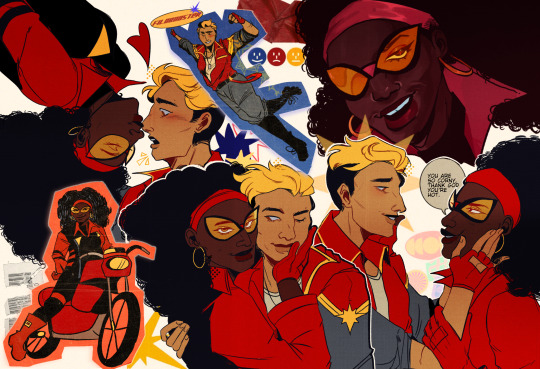
atsv caroljess for the soul
669 notes
·
View notes
Text

just started reading Saga and I'm losing it at this panel 😭
0 notes
Text


Having a moment
#helena bertinelli#renee montoya#harvey dent#dc#fanart#harvey will catch these hands if he ever gets near renee again#also reneehelena 🫶 pookies
355 notes
·
View notes













